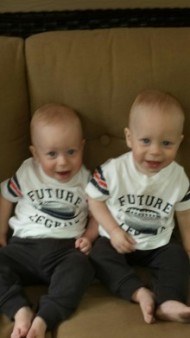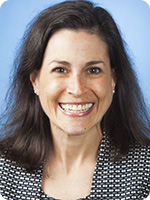Peyton Hughes, at 4 months old, had trouble breathing. It looked like a cold, but his symptoms grew worse, and he was taken to Northeast Georgia Medical Center in Gainesville in February.
He was diagnosed with respiratory syncytial virus. commonly known as RSV. Peyton was transferred to Children’s Healthcare of Atlanta’s Egleston hospital. He was soon joined by his twin brother Jaxon, who also had the virus.
“It was extremely scary, not knowing a lot about RSV,’’ says their mother, Emilee Hughes, a Hall County teacher.
Respiratory syncytial virus infects the lungs and breathing passages. Healthy people who get it usually experience mild symptoms that resemble those of the common cold, and recover in a week or two. But RSV can be serious, especially for infants and older adults.
It’s the most common cause of bronchiolitis (inflammation of the small airways in the lung) and pneumonia in children younger than 1 year of age, according to the CDC.
RSV is associated with an estimated 300 infant deaths per year in the United States and 200,000 infant deaths worldwide. Each year in this country, an estimated 75,000 to 125,000 infants are hospitalized with RSV. Most are younger than 6 months of age.
Children’s Healthcare of Atlanta officials say they have seen RSV cases go up this year.
Dr. Andi Shane, a physician at Children’s Healthcare of Atlanta and an associate professor of pediatrics at Emory School of Medicine, says the increase in RSV infections has come at the same time as a high number of other respiratory virus infections in children, including rhinovirus and adenovirus cases.
RSV often infects young children who were born prematurely or have an underlying respiratory or cardiac condition, Shane says.
The twins Peyton and Jaxon had been born prematurely.
Peyton was hospitalized for 12 days and Jaxon for five days. Both are healthy now, their mother says, and just celebrated their first birthday.
Hopes for a vaccine
Shane of Children’s says a warning sign for parents on possible RSV is when their child has trouble breathing.
“They are using a lot of effort to breathe, and there’s often a lot of coughing,’’ Shane says. “Sometimes they may have high fevers.”
RSV is spread by contact with respiratory droplets, she notes. “Good hand hygiene is very important’’ for parents and children to prevent transmission of RSV and other respiratory diseases.
Researchers at Emory and Children’s are working on developing a vaccine for RSV, which would be a huge breakthrough.
Marty Moore, an assistant professor of pediatrics at Emory School of Medicine, says there’s been a nationwide effort for decades to create an RSV vaccine, but it has not been successful.
Moore’s team, though, has engineered a vaccine strain that he calls very potent and predicts will be safe. “The next step is to start a clinical trial,’’ he says. The research team has formed a company, and Moore says it has drawn interest from drug companies.
He says he’s excited about the RSV vaccine work. “I’m doing the work I should be doing,’’ Moore says.
Children’s has some important history with vaccines. Dr. Leila Denmark, Egleston’s first intern and a legendary figure in the medical field, helped develop the vaccine for pertussis, or whooping cough, in the 1930s. (Here’s an article on Denmark, who died in Athens at age 114.)


